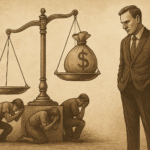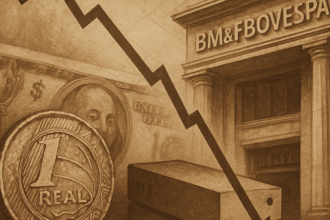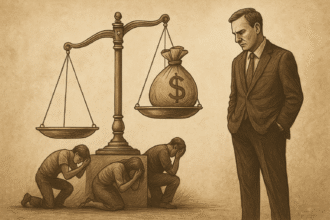Brazil is going through yet another fiscal crisis. Growing deficits, budget shortfalls, rising public debt and announcements of cuts in several areas. The press warns of the “need for adjustment”. The government talks about responsibility. The population feels it in their pockets — higher prices, poor services, unemployment and ever-rising taxes.
But, in the midst of this scenario, there is a group that does not suffer cuts, does not lose adjustments, does not experience crisis. They are the untouchables of the public machine. Those protected by the State. Those for whom fiscal collapse is just a headline — never a threat.
This article will expose who these groups are, how they perpetuate themselves, and why the discourse of the crisis never reaches everyone. While there is talk of collective sacrifice, state privilege remains shielded.
The farce of the “crisis for everyone”
Every time the government announces spending cuts, the rhetoric is the same: “It’s time for everyone to contribute.” The problem is that “everyone” never includes the most privileged in the system. The cuts fall on health, basic education, public safety, transportation subsidies, small cultural initiatives or specific aid.
But the top of the pyramid — where judges, prosecutors, ministers, directors of state-owned companies, party funds, special funds of the Judiciary and salaries above the ceiling are located — remains untouched. There is no cut. There is no delay. And when there is criticism, the response is legal: “acquired right”.
Brazil lives under a system where the privilege is protected by legality, while freedom is seen as instability.
Shielded power: Judiciary and high public salaries
Among the most untouchable members of the crisis are the members of the Judiciary: judges, appellate court judges, ministers of higher courts and their cabinets. Their salaries exceed the constitutional ceiling, benefits are generous (housing, food, transportation, books, daycare) and raises are regular — even though inflation erodes the salary of the average citizen.
Meanwhile, essential sectors of the public service suffer from a lack of structure and personnel. But the Judiciary's budget continues to grow. Not because of efficiency — but because of political strength and budgetary independence.
This reality was highlighted in the article The Fiscal Elite: How High-Ranking Civil Servants Survive the Crisis, where we show that there is no uniform crisis. There is selective austerity.
Party funds and the untouchable budget of politics
Another sector that has not seen cuts is party politics. The electoral fund and the party fund are supplied with billions in public resources, regardless of the fiscal scenario. Each year, new discussions are opened to increase these transfers — even in the midst of the pandemic, economic stagnation and the breach of the spending cap.
Parties do not need to be accountable to citizens, they do not depend on voluntary donations and they do not need to deliver results. They live off automatic transfers, guaranteed by law. While the informal entrepreneur struggles to pay the MEI, parties receive millions of dollars per elected deputy.
And the speech remains: it is to guarantee democracy.
Deficit state-owned companies with surplus salaries
Brazil has maintained state-owned companies that have been operating at a loss for decades — but they continue to exist. Not out of economic necessity, but out of political convenience. These companies shelter allies, distribute commissioned positions, move billion-dollar contracts and serve as a shelter of privilege disguised as a social function.
The payroll of these state-owned companies shows salaries that are well above the private sector average, generous bonuses and job security. When it comes to administrative reform, these structures are spared. When it comes to “efficiency”, it is always demanded of small business owners — never of the public sector.
Civil servants protected by law
There are public servants who work hard, are poorly paid and suffer from poor conditions. But the top echelons of the civil service are not in this group. With starting salaries above R$20,000, automatic progressions, extended vacations, paid leave and full retirement, this group represents the state elite that lives immune to the crisis.
Any attempt at reform is fought with legal discourses, preventive strikes and coordinated parliamentary action. The machine protects itself — with the laws that it itself writes and interprets.
Who pays the bill: the orphan taxpayer
While these groups maintain their privileges, the common taxpayer is the one who pays the bill. The citizen who has no job security, no electoral fund, no bonuses, no assistance. Who pays increasingly higher taxes, faces bureaucracy, suffers from poor services — and is still accused of “tax evasion” when he tries to survive outside of the oppressive formality.
The article The New Invisible Tax: How Inflation Erodes Wages and Shields Privileges shows how even the currency is manipulated to protect those at the top. Inflation, public debt and the devaluation of the real are policies of concentration of power — not economic accidents.
The politics of privilege is not the exception. It is the rule.
The system is not in crisis. It is working exactly as it was designed: to protect those inside and charge more from those outside. The Brazilian public sector is a legal-fiscal castle surrounded by a moat of laws, charges and bureaucracy. Those who enter, do not leave. Those who are outside, do not enter.
There is no real reform as long as the true centers of privilege are spared. There is no fiscal balance as long as the top is shielded and the bottom is sacrificed.
📩 Do you want to understand who really benefits from the crisis?
Subscribe to the newsletter Economic Radar and receive weekly analyses that expose the backstage of the state machine and the economic lies that sustain privilege.





